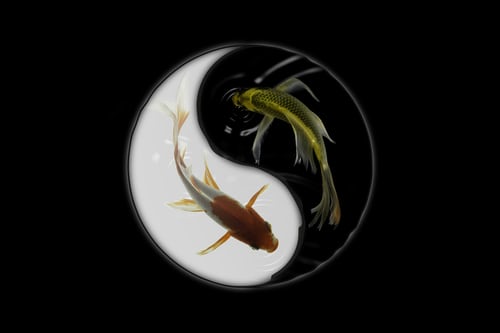“Old Heraclitus, who was indeed a very great sage, discovered the most marvelous of all psychological laws: the regulative function of opposites. He called it enantiodromia, a running contrariwise, by which he meant that sooner or later everything runs into its opposite.” –Carl Jung
I recently recognized a shocking and fascinating phenomenon that was occurring more frequently in my adult life.
When I took certain principles too far, they ceased to bring me the intended result. In fact, they even produced the opposite of what I was aiming for.
When I pushed too hard for happiness and peace—I began to experience increased frustration, despair, and agitation.
I was unintentionally generating greater suffering for myself and those around me.
Let me give you two examples.
Years ago, my wife and I went through Financial Peace University, undoubtedly one of the most important things I have ever done in my life.
We started living on a budget, paying off debt, and investing more in retirement. We took this process very seriously and got pretty intense with our finances. In this process, I began to indeed experience greater peace and a better sense of control over our financial future.
But then something interesting happened.
At some point in this journey, I began to experience increasing fear, anxiety, and a sense that we would never have enough money to reach our goals. I began to have more of a clinging or hoarding mentality.
This was interesting to me because our financial situation was improving year by year.
Our goal was peace with money and prudent planning, but I began to experience greater unhappiness and restlessness. How could this be?
Another example is excessive planning.
As you may know from reading my prior posts, I advocate for writing down the vision you have for your life and making intentional investments of your time to achieve your goals over the course of your lifetime.
A written Life Plan has helped me to become much more intentional with my time on this planet, and has certainly improved many areas of my life.
Initially, it gave me tremendous peace to know that I was taking active steps to improve my health, marriage, parenting, spiritual life, etc.
But again—at some point in this journey—I began to experience fear, anxiety, and discontentment again.
I was so focused on the future that I was no longer living in the present.
And when the future arrived and didn’t match up to the vision I had written down, I felt increasing frustration and despair.
Instead of producing the intended peace, fulfillment, and happiness—the Life Plan began to produce the opposite of those feelings inside me.
Somewhere along the path, I had become too rigid. I was gripping too tightly, clinging inflexibly to the future I had constructed in my mind.
This is the achiever’s curse, and a recipe for increased suffering.
The genius of Jung
I recently came across an interesting term in the writings of Carl Jung which has helped me in this struggle.
More specifically, the concept described by Jung has helped me better recognize where I have voluntarily, and unintentionally, increased my own suffering.
The idea is Enantiodromia.
This term, originally discussed in the writings of Heraclitus, (and later coined by Stobaeus in the 5th century) is essentially this: When things get to their extreme, they turn into their opposite.
Heraclitus (and later other philosophers and scientists) first observed this phenomena in the natural world.
The Law of Equilibrium (also known as Le Chatelier’s Principle) in modern chemistry, says that any extreme is opposed by the system in order to restore balance.
More than 2000 years ago, Heraclitus observed, “Cold things warm, and warm things cool. Wet things dry, and parched things get wet.”
Temperatures rise until clouds burst with rain, which cool things down.
The trough of a wave creates the crest.
A pendulum swings until it reaches the point at which it must return with full force.
Jung later applied this observation to psychological phenomena.
Jung wrote, “This characteristic phenomenon practically always occurs when an extreme, one-sided tendency dominates conscious life; in time an equally powerful counter position is built up, which first inhibits the conscious performance and subsequently breaks through the conscious control.”
He defined Enantiodromia as “the emergence of the unconscious opposite in the course of time.”
This principle was also identified by ancient Chinese Philosophers in the notion of Yin and Yang. A central premise of the I Ching is that yang lines become yin when they have reached their extreme, and vice versa.
Interestingly, Jung also said that Enantiodromia would often precede a rebirth of personality.
That has certainly been the case for me.
After understanding this concept, I am better equipped to recognize where my inflexibility may produce the opposite of my intended result, and I have begun to make significant changes in how I think about and react to situations in my life.
A final thought on parenting
I was recently reading a Love and Logic parenting book in which author Jim Faye was reflecting on his 50 years of experience as a father, principal, and parent-educator.
He observed that the parents who wanted to protect their children from ever experiencing unhappiness, seemed to end up with children who were extremely unhappy in adulthood because they had continuously deprived their children of situations that would have helped them to develop the ability to better cope with unhappiness.
The extreme goal of keeping them happy at all times, ended up producing the opposite result.
Take action now
This blog has always been about personal leadership, and personal leadership begins with self-awareness, so I will leave you with a question for reflection:
In what ways have you taken any idea in your life to such an extreme that it may be producing the opposite of your desired outcome?
Have a great weekend!
Parker
*If you have enjoyed Parker’s blog, check out The Next Peak Podcast that Parker co-hosts. We interview successful leaders and discuss research-based principles that help people win in the workplace without compromising the things that matter most—relationships, a life of purpose, and health
Want more? Suggested Resources Below




